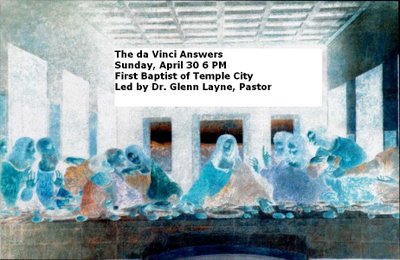Personal reflections on the what's important from an evangelical perspective. This blog speaks for no organization. It's just the ruminations of one blogger trying to make sense of the New Reformation times we live in.
Sunday, April 30, 2006
Medley Reacts to PSW Vote
ABCUSA: American Baptist Churches, U.S.A. And Their Pacific Southwest Region One Step Closer To Part
From "Jayne, Andy" <Ajayne@ABC-USA.org>Date Sat, 29 Apr 2006 22:27:13 -0400
VALLEY FORGE, PA --In a non-binding referendum taken Saturday, April 29, 1125 delegates of the American Baptist Churches of the Pacific Southwest (ABCPSW) voted to recommend that the region leave the Covenant of Relationships with the American Baptist Churches USA (ABCUSA). 209 delegates voted in opposition, and just over 50% of the member churches registered to participate in the vote. The Covenant of Relationships is the written agreement that binds the region with the larger ABCUSA family. The vote, taken without discussion, now goes to the region's Board of Directors for a final decision at a meeting on May 11, 2006.
It was taken without discussion because of the many meetings around the region and in churches. The vast majority of those present were "bound delegates" anyway...
"It is with profound sorrow that we have come to this point of separation," said Dr. A. Roy Medley, general secretary of ABCUSA. "Though not uncommon in Baptist life, such actions grieve the heart of God and our Lord Jesus Christ." Rev. Arlee Griffin, Jr., Ph.D., president of ABCUSA, added, "We regret the actions of some of the churches in ABCPSW in breaking the unity of our denominational family. We consider it unfortunate that, at a time when secular society is merging and coming together, there are those in our Christian family who seek to divide even in light of our Lord's request to remain one in unity."
Translation: you PSW hacks are schismatics; haven't you ever read John 17? I wonder what they would have said to Luther.
"We give our blessing to the region, if it chooses on May 11 to leave, that they may do God's work as they feel led," said Medley. "Though the vote was not unanticipated, we had hoped and had made many efforts to keep the unity of the Spirit through the bond of peace," he added.
Even if the region does leave the Covenant of Relationships, not all the churches of ABCPSW will leave. A significant number of churches wish to remain American Baptist. They will form an Association of American Baptist Churches immediately if the region board votes on May 11 to break covenant. Dr. Samuel Chetti, executive minister of the Los Angeles Baptist City Mission Society, with the endorsement of his board, will give watch-care and oversight to the new association. There will continue to be a strong American Baptist presence even if the region splits away. "Most individual churches will be slow to take action to leave," said Joe DeRoulhac, Jr., Ph.D., pastor of First Baptist Church of Redlands, and strong supporter of ABCUSA mission. "The complexity of the possible separation will take a long time to sort out."
VF is kidding itself if it think that the ABC presence in the PSW area will be strong. It will be weak and insignificant.
"ABCUSA will continue its clear focus in mission and ministry to spread the Gospel of Jesus Christ. We are committed," said Medley, "to the seven Key Ministry Areas of Radical Discipleship, Healthy Missional Churches, Leadership, Church Planting, Youth, Stewardship and Mutual Faithfulness. God has given us a compelling mission and call. American Baptist Churches are healthy missional churches that nurture devoted disciples of Jesus Christ who live their lives in mission and ministry for the healing of the world through the love of God." Chetti added,
"ABCUSA has always held the Bible to be the standard and authority for Christian living. We are a Bible-based people and, since our inception, our mission and ministry have always been guided by the wisdom of the Scripture."
Translation: those PSW yahoos are fundamentalists; we are the true center. Yeah, right.
For further information, please contact the Office of the General Secretary at 800-222-3872. If immediate assistance is needed, please contact Dr. Robert H. Roberts at 610-585-8023.
AP Reports on PSW Decision
By CHRISTINA ALMEIDA, Associated Press Writer Sat Apr 29, 10:44 PM ET
LOS ANGELES - Delegates from the American Baptist Churches of the Pacific Southwest voted overwhelmingly Saturday to recommend severing ties with the national denomination in a dispute over homosexuality.
Members from the region's 300 churches are upset American Baptist Churches, USA, has not disciplined congregations with liberal gay policies even though the denomination has a strict definition that says "homosexuality is incompatible with biblical teaching."
The matter now goes to the region's board of directors, which meets May 11 and already recommended withdrawal from the denomination citing "deep differences of theological convictions and values."
The board had the authority to withdraw on its own, but decided to seek input from the delegates, according to a statement on the group's Web site.
The delegates — who met in seven locations across the West, including First Baptist Church in Pomona — voted 1,125 to 209 to withdraw.
There has been a growing split within the 1.4 million-member denomination concerning homosexuality.
Last year, the West Virginia association, the largest regional group with 465 congregations, narrowly rejected a proposal to break with the national denomination.
Saturday, April 29, 2006
What Does the PSW Vote Mean?
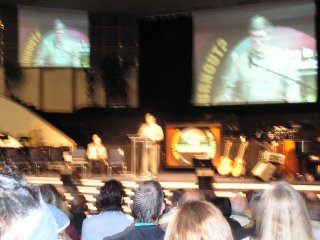 Photo: vote totals being announced at Pomona.
Photo: vote totals being announced at Pomona.Now that the people of the PSW have spoken, loudly and clearly, what does it all mean? This will be processed extensively over the coming months and even years, but let me suggest this as a starting point:
1. Motivated and theologically-centered people can indeed overcome the weight of denominational loyalty and take a costly stand.
2. Other regions will be enboldened to act. PSW is blazing the trail. Some will separate, some will find a way to straddle the line. Without being personal, this clearly is a "The Witch is Dead" moment (as in "The Wizard of Oz"). You can leave the ABC without perishing. You may even thrive.
3. VF, though they knew it was coming, will continue to live in denial. The Executive Ministers don't have that luxery. Some will get on board; some will be pushed overboard.
4. The VF mechanism will continue to lurch on toward collaspe. Heroic efforts ("The Common Table") will be made which will engender some reforms, but so long as the substance of the Michigan Plan and the Indiana Initiative is denied, they will fail.
5. This is the (narrow) window for the Cornerstone Church Network to succeed. CCN does not get traction by the end of 2006, I doubt it will make it.
OFFICIAL PRESS RELEASE ON PSW VOTE TO SEPRATE FROM ABCUSA
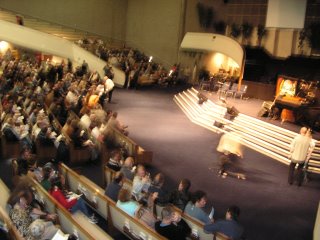
Churches Vote on Denominational Relationship
Delegates from the congregations of the American Baptist Churches of the Pacific Southwest (ABCPSW) voted 1125 "yes" to 209 "no" in support of a recommendation to withdraw from the Covenant of relationships with the American Baptist Churches, USA. Delegates, meeting in seven locations in Southern California, Arizona, Nevada and Hawaii, were voting on the question, "Should the American Baptist Churches of the Pacific Southwest withdraw from the Covenant of Relationships and Agreements with the American Baptist Churches, USA, as recommended by the Board of Directors of the American Baptist Churches of the Pacific Southwest?" This vote by the delegates will be referred to a meeting of the ABCPSW Board of Directors for action on May 11.
The Board of Directors, stating that "deep differences of theological convictions and values between the American Baptist Churches of the Pacific Southwest (ABCPSW) and the American Baptist Churches in the USA (ABCUSA) are understood by the Board of Directors of the ABCPSW as irreconcilable," had recommended withdrawal from its covenant relationship with the ABCUSA. While the Board had authority on its own to withdraw from the national denomination, it called for a special meeting of delegates from churches "to provide the Board with the guidance and input it needs to make a responsible and informed decision."
The main location of the meeting was First Baptist Church, Pomona, California, from which the meeting was chaired by Region President, Brian Scrivens. Connecting to the main site by telephone, amplified through public address systems were satellite sites in San Diego and San Luis Obispo in California, Phoenix and Polacca in Arizona, Las Vegas, Nevada, and Honolulu, Hawaii.
From http://www.abcpsw.com/pressrelease.html
BREAKING NEWS: PSW CHURCH DELEGATES VOTE OVERWHELMINGLY TO SEPARATE FROM ABCUSA
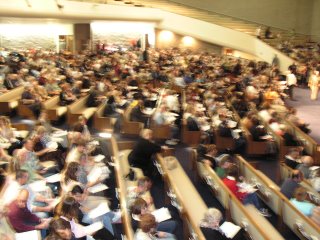
By a margin of 1125 to 209, delegates from Pacific Southwest Region churches voted to support the reccomendation of the Region Board to separate from the ABCUSA. That's 84.3% yes, 15.7% no, just slightly higher than the 80% that Durable Data predicted from the outset.
The process took almost exactly an hour and involved a central site at FBC Pomona, CA, with satellite voting locations linked by teleconferene in Honolulu, San Luis Obispo, Las Vegas, San Diego, Phoenix and Polacca, AZ (Navajo Nation).
I will post the official press release shortly as well as additional photos from the Pomona meeting.
Friday, April 28, 2006
Coverage of the PSW Vote
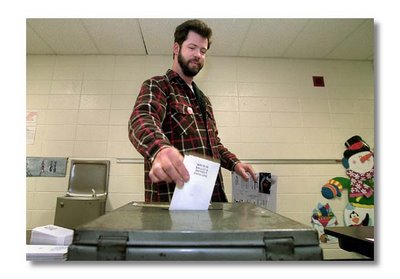
On Saturday, April 29, delegates from churches across the PSW region will meet and cast their votes on the reccomendation of the Region Board that PSW separate from the National Body.
DD will be there--as a delegate. Votes will be cast at about 10:30-11:00 Pacific, and I will be back at the keyboard by about 1 PM Pacific. The results will be compiled and released immediately. Therefore, by about 1 PM Pacific, DD readers will know what's happened.
Check this space for two reports: a Breaking News report with the vote tally and a piece a little later on What it All Means.
Story developing...
Tuesday, April 25, 2006
VF, Medley, Never Seem to Learn: Way Too Little, Way Too Late

Above is a scan of a letter received at my office today--four days before the "big vote" on the future of the PSW. (You can click on it for a larger image.)
All I can say is what Abba Eban said about the Palestinians: "They never miss an opportunity to miss an opportunity."
In one short page, Dr. Medley implies we are schismatics and tells us that we should link up with "loyal" American Baptists.
In the same mailing was an issue of "Pastor to Pastor", which was notable for two things. First, this issue was painted in evangelical colors. It was all about baptisms, evangelism and missional emphases. Second, the PSW impasse is described as a potential "breaking" of the covenant of relationships. "Breaking" the covenant implies a doing of wrong. (As in the sentence, "Israel broke the covenant; therefore the Lord sent Israel into exile.")
What the PSW board has recommended is NOT a breaking of the Covenant, but rather a dissolution of the covenant, following the means that have long been in place.
At a future time, I want to muse more on what being an American Baptist is, but let me just say this: where does VF get off in deciding who is and who isn't an American Baptist? Is connection to the OGS the deciding factor in the American Baptist identity? As I said, more to come...
Sunday, April 23, 2006
100 Years of a "New Pentecost" elebrated in Los Angeles
 From today's Los Angeles Times online:
From today's Los Angeles Times online:Pentecostals Praise God in Many Tongues
Believers worldwide gather in L.A. -- singing, dancing and shouting -- to mark the 100th anniversary of the Azusa Street Revival.
By K. Connie Kang, Times Staff WriterApril 23, 2006
Carrying banners and making music, about 3,000 exuberant Christians on Saturday kicked off a weeklong centennial celebration of the birthplace of modern Pentecostalism in Little Tokyo with a "Holy Spirit Procession" through downtown Los Angeles.Thousands of Christians worldwide are coming to Los Angeles this week to mark the 100th anniversary of what is called the Azusa Street Revival, considered the cradle of the global Pentecostal movement, the fastest growing branch of Christianity, with 500 million adherents.
Saturday's march began at a modest house on Bonnie Brae Street where William J. Seymour, an African American preacher, once held prayer meetings, and ended on Little Tokyo's Azusa Street, where he established a multiracial mission that church historians say grew into the modern Pentecostal movement."
It's so incredible to see all the nations coming together, not just to celebrate but to ask God for another outpouring of the Holy Spirit," said the Rev. Jonathan Ngai, pastor of Transformations Community Church in Arcadia, which is not affiliated with the Pentecostal movement. Many in the procession carried flags of various nations and banners referring to Jesus as "King of Kings" and "Prince of Peace."
Some cried out "Praise the Lord!" and "Hallelujah! as they marched and danced down Beverly Boulevard to 1st Street, and then to Noguchi Plaza in front of the Japanese American Cultural and Community Center, where Seymour's ramshackle church once stood.
There, under a large tent replicating the original size of the old church, event organizers, internationally known pastors, community leaders and invited guests held an opening ceremony and dedicatory prayer.
Then, with the blowing of the shofar — a ram's horn — by a contingent of Messianic Jews, the festivities began with hundreds of people spreading out across Noguchi Plaza singing and playing music. Several thousand people, some with babies in strollers, lingered at the plaza well into midafternoon to worship with songs and dances.
Pentecostals are known for their spontaneous, fervent worship style and praying aloud. There are many groups within the Pentecostal movement, but what unites them is their belief that the spiritual gifts of speaking in tongues, witnessing signs and performing miracles are available to them through baptism, as they were to Jesus' apostles.
Sometimes this is called a second blessing, said the Rev. David Scholer, professor of New Testament at Fuller Theological Seminary and an ordained American Baptist minister. In contrast, mainline Protestants believe that once they are saved, the rest of the Christian life is a process "theologically called sanctification," he added.
Though few outside Pentecostalism know of him, Pastor Seymour, a son of slaves from Louisiana, held round-the-clock religious revivals that drew thousands of people of all races to the Azusa Street Mission.
His ministry began at a prayer meeting on April 9, 1906, at 216 N. Bonnie Brae St., when it was "visited by a move of the Holy Spirit" and people began to speak and sing in tongues, according to the Rev. Cecil M. Robeck Jr., an authority on Pentecostalism and author of "The Azusa Street Mission and Revival: The Birth of the Global Pentecostal Movement." Within days, his flock had grown so large that he had to find a bigger place — an abandoned building at 312 Azusa St. that had once been the home of the congregation that would later become First AME Church, Robeck said.From 1906 through 1909, the Azusa Street Mission received worldwide attention.
Some at Saturday's events had compelling testimonies of their own. Steve Hamilton, an electrician from San Bernardino, said he came "to celebrate Jesus for renewing my life and dying on the cross for me." He said he was abandoned by his mother when he was 10 and lived on the streets, "strung out on drugs and alcohol," until he had a personal encounter with Jesus through the Salvation Army when he was 35. Seven years later, he is a "happy" man — clean from drugs and alcohol, has a well-paying job, is married and has a daughter, he said.
Many events are scheduled throughout the week at venues throughout the city. There will be conferences for pastors and women in the ministry, rallies commemorating Seymour, revival services, a special service for Native Americans, and an international youth convocation. Today, some of the 150 visiting Pentecostal pastors will be preaching in area churches. At 7 p.m. Monday a multiethnic worship service is scheduled at the Los Angeles Convention Center.
Information on the centennial events is available at www.azusastreet.com.
Friday, April 21, 2006
Survey results: Church not important for spiritual growth, Americans say
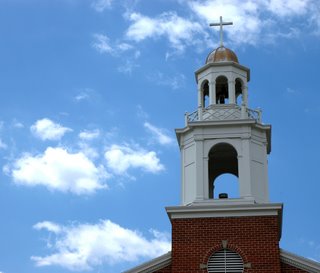
By Hannah Elliott
Published April 21, 2006
DALLAS (ABP) -- Almost three-fourths of Americans claim to be Christians, but only a small fraction consider church the place to deepen their faith, a new survey says.
Less than 20 percent of American adults believe participation in a congregation is critical to spiritual growth, and just as few agree that only through participation in a faith community will they reach their full potential, the Barna Research Group reported April 18.
Based on interviews with 1,003 adults from across the nation, the telephone surveys also found that as few as 17 percent of adults said “a person’s faith is meant to be developed mainly by involvement in a local church.” What’s more, only one-third of all evangelicals -- the group most likely to attend church -- endorsed the concept.
And while 72 percent of Americans claim they have personally committed themselves to Jesus Christ, less than 50 percent attend religious services on a weekly basis.
“These figures emphasize how soft people’s commitment to God is,” evangelical researcher George Barna said in the report. “Americans are willing to expend some energy in religious activities such as attending church and reading the Bible, and they are willing to throw some money in the offering basket, but when it comes time to truly establishing their priorities and making a tangible commitment to knowing and loving God, most people stop short."
Barna also said the results should challenge church leaders to foster a “more positive community experience.” Instead of a generic church model, which emphasizes attendance and experience-driven services, Barna said, churches should try for relationships that are less fluid in nature.
“Jesus’ example leaves no room for doubt about the significance of involvement in a faith community,” he said, adding that a “biblical understanding of the preeminence of community life” takes strategic planning and time.
The survey, conducted in January, queried a random sampling of people 18 years and older living in the continental United States. The geographic distribution of survey respondents corresponded to that of the U.S. population.
Source: http://www.abpnews.com/973.article
Thursday, April 20, 2006
McFadden Blows Lid off "Oasis"; PSW Vote Expected to be Representative

Earlier today, Dennis McFadden (www.hisbarkingdog.blogspot.com) blew the lid off the beatific vision that had been reported at the ABC "Wait on the Lord" conference going on in Florida (where most of the American Baptists are retired and attending Southern Baptist Churches):
VALLEY FORGE, PA (ABNS)-The Wait On The Lord Conference in Orlando, FL is still in progress but is already being heralded as a resounding success. Heralded as a "Spiritual Oasis" by ABCUSA General Secretary, Roy Medley, the conference is designed for ministers and lay ministers to foster Christian spiritual formation and rejuvenation...
McFadden comments:
. . . Reading the ABC press release, one would think that this year’s “Wait on the Lord Conference” in Orlando represents a new Pentecost come upon American Baptists. Even before it concludes, the ABNS has dubbed it a “resounding success.” With 275 attendees, Dr. Roy Medley describes it as a “Spiritual Oasis.”
But who are the people being held up as models for ministry in the ABCUSA? The keynoter, Dr. John Kinney, pastors Ebenezer Baptist Church in Beaversdam, VA. In addition to his reputation as a distinguished systematic theologian, Dr. Kinney has been claimed by the Center for Gay and Lesbian Studies in Religion and Ministry as leading one of the “African American Welcoming Churches” in the country (http://www.clgs.org/3/welcoming_churches.html).
Bible study leader, Dr. Jaime Clark-Soles, Assistant Professor of New Testament at Perkins School of Theology, Southern Methodist University, holds ABC ordination and serves as “Scholar in Residence” at the multiply affiliated City Church of Dallas (http://www.citychurchdallas.org/index.php?About_CityChurch:Leadership:Jaime_Clark-Soles). City Church boasts of its “welcoming” stance and has on its Web site “A Biblical Affirmation of homosexuality” (http://www.godmademegay.com/).
So, let’s get this straight (no pun intended). The ABCUSA has declared that the practice of homosexuality is “incompatible with biblical teaching.” So, when we assemble our pastoral leaders from regions all across the denomination to “Wait on the Lord,” we bring in a keynote speaker and Bible study leader who serve on staff in churches committed to the proposition that homosexuality is to be welcomed and affirmed? Does anyone else see a problem with this picture?I wonder why the right keeps saying that the national leadership tilts left? Could it be due to breathlessly enthusiastic complicity with the agenda of the AWAB movement if not open advocacy of its position?
I have to admit that I wondered where the conference leaders were "coming from" and in a sense, it's no surprise to me that no sense was involved in this nonsense (get my sense?).
Nice job Dennis; you deserve a Pulitzer for that one.
In other news, I was at a meeting today where people in a position to know indicated that a substancial portion of the churches in the PSW and available delegates have indeed registered. (The deadline was last Thursday.) Actually, I was given specific figures, but was asked not to publish them, a request I always honor. Bottom line: any concern that the delegates and churches meeting on 29 April will be a non-representative "rump congress" is unfounded.
Tuesday, April 18, 2006
Is the "Shared Table" Decentralized Enough? Or is it Too Little, Too Late?

Dennis McFadden reported on the Shared Table proposal now floating around ABC circles. It appears that the powers that be have written off PSW and are looking ahead. Is this a watered down version of the Michigan proposal? Is it enough? Is it too little, too late? I admit to mixed feelings. Some of these are flashes of remarkable realism. Others reflect a denial of reality and a stubborn adherance to The Old Order. We still need to abolish the Office of General Secretary and to liberate the program boards.
A VISION FOR THE FUTURE OF THE ABCUSA: A NATIONAL TABLE
In response to the November 2005 GEC vote by consensus to begin a discussion on changes to our current covenantal system, a group of REMC colleagues have been discussing on an informal basis ideas about structural changes which might be enacted to ensure a vital, vibrant future for ABCUSA. This vision is intended to encourage and focus our conversation in the days ahead.As loyal American Baptist Executive Ministers, we see our denomination imploding – and do not want to see it happen. The current covenantal system is broken and appears to be unable to resolve issues that come before us. Our current financial situation – one of declining support for United Mission – is an expression of how local churches feel about the state of the national body and the mission priorities they wish to fund. Giving trends indicate increasing designated giving toward regional work and special projects, and away from UM.
We continue to believe that we have a common mission as American Baptists. ABCUSA mission agencies and trans-regional expressions of ABC life have significant and special value to the extent they advance mission in partnership with local churches and ABC regions. In an age of radically changing structures, we feel the need to propose and create new organizational models for our common witness, where meaningful ministry-related decisions can be made. We sincerely hope that people of good will across theological spectrums will be able to embrace this vision; it is intended to include, and not exclude.
These new models should emerge in response to certain key principles:
a. We need to move toward organizational de-centralization. Both societal trends and denominational realities require that we move toward a more decentralized structure. The current representational system (OGS/GB/NEC/GEC/REMC) is not being supported by local church giving patterns.
b. We need to strengthen regional identity as a key ABC representational entity. The regions are parallel ministries, which come together at a national table of conversation and consultation, for common mission. We need to set free our ABCUSA mission agencies, AROs and Caucuses to advance their mission in the 21st Century, without the encumbrance of outdated bureaucratic complexities.
c. We need to maintain and strengthen a balanced commitment to and application of basic Baptist principles, which we all affirm and cherish. We wish to preserve the best of ABC polity and history as we face the future with faith. Nothing in this proposed vision is intended to weaken our historic Baptist distinctives, but rather to strengthen our ability to express them in our common life and witness.
d. The National Table needs to be transformed from a legislative/policy entity to a consultative venue in which regional partners coordinate and consult with one another on common mission endeavors. We wish to affirm the autonomy of the local church and regions to follow Jesus Christ as Savior and Lord. We do not wish to continue a process of fighting over resolutions and statements of concern. We also wish to emphasize the historic Baptist commitment to the associational principle, in which we act responsibly in order to strengthen the life of all the partners within our fellowship. We seek a way to minimize future divisiveness.
e. We are all absolutely committed to our heritage of racial, ethnic and cultural inclusiveness. We recognize that we have not always live out this commitment as a denominational family, and we believe it is essential for the integrity of our common witness that we do so more faithfully in the future.
In accordance with these 5 principles, we propose the following vision of a new ABCUSA National Table. It is an outline, intended to be a pro-active and creative entreaty to all of our ABC constituency. Please consider it with an open heart and mind!
1. The Formation of a De-centralized and Leaner Shared Table: In place of the currently stressed multi-level representational system GS/GB/NEC/GEC/REMC), we propose the creation of a new “Shared Table” composed of Regional Executive Ministers, who will come together nationally for significant events and occasions, for purposes such as worship, celebration, the proclamation of the Gospel, and the strengthening of congregational life and mission. The focus of the Shared Table in consultative, not governance. Administratively, the “Center” is lessened to a few select and necessary activities (shared support services, ecumenical relationships, coordinating gatherings). The Shared Table will elect its officers. The Table sill call a Secretary with very limited responsibilities, and responsible to it. She/he may represent the family in ceremonial and ecumenical affairs. The purpose of the Shared Table is to promote cooperation in mission, and to share wisdom and regional needs/stories.
2. The Embracing of Increased Local Church and Regional Autonomy: Local churches hold regional membership, which can be geographical, or affinity based – the local church decides where it affiliates (it can still also be disciplined by an association and/or region). Regions determine standards for admitting and dismissing churches, ordination standards and reciprocity.
3. ABCUSA Belongs to its People: Biennial meetings (or variations, like virtual meetings) would serve as custodians of the ABCUSA constitution and by-laws. This is where ultimately lay people and local church pastors retain ownership of ABCUSA. The National Table’s Secretary could also have her/his call affirmed by the Biennial gathering.
4. Promoting a More Nimble and Flexible ABC Missional Network: National Boards, AROs, Caucuses form their own independent Boards, which for their own benefit would no doubt be composed of ABC stakeholders from across the regions. Members of the ABC Missional Network would be invited to share with the Table in order to foster communication and cooperative mission. They could partner with individual regions or churches for a variety of mission endeavors.
5. In order to promote unity and an ongoing sense of American Baptist identity, we propose the adoption of the following list of Shared Values:
1. Jesus Christ is the Head of Our Shared Table!
2. Reformational, Anabaptist and English Baptist Roots
3. American Baptist Heritage
4. Continuing Commitment to ABC ethnic and cultural diversity
5. The Current “We are American Baptists” (2005)
These Shared Values characterize, we believe, the deeply held convictions of the vast majority of lay people, pastors, churches and regions in our American Baptist family. When we gather at the national common table, partners will live out, abide by and respect the values, norms and rules of the Shared Table. For the sake of the whole, they would not send to the National Table people who do not subscribe to these values.
6. As American Baptists, we will engage the culture – both prophetically and pastorally – primarily through our host of local churches. Regions may issue joint statements, if they wish, but they shall not be construed as speaking for all American Baptists. If statements are made in the name of the entire Fellowship at the Shared Table level, the threshold for acceptance should be very high.
7. Funding Mission in a De-centralized ABCUSA: The Table Partners will raise the funds for the Table, if the Endowment gained through the sale of the Valley Forgeproperty cannot cover all expenses. United Mission would be replaced by a system in which each of the current partners to the Covenant (Regions/National Ministries/International Ministries/Other ABC partners) would be represented. Churches could give directly to ABC Network Partners or through their regional offices. The fundamental principle is this: churches choose how much to give to whom. Each partner is set free to do fund raising, in cooperation with others, as they feel is best.
West Virginia to Keep the Pressure on Valley Forge

The WV Baptist Convention is "not happy" with Valley Forge, and the intent to keep the pressure on is reflected in this email sent by exec David Carrico to the WVBC community:
April 18, 2006
Friends in Christ,
As Christians we celebrated one of our grandest Sundays in the year - Resurrection Sunday!! Every Lord’s Day is great, but Easter is grand. What a day of witness and proclamation.
Last week I returned from the GEC meeting in Valley Forge and there is an attachment explaining that meeting in a press release format. The second attachment is titled “A Vision for the Future of the ABCUSA National Shared Table.” Both of these attachments are for your information.
There is great promise surrounding the June General Board meeting. I believe at this June meeting a more firm date-line will emerge for change. Along with a discussion about the concept of the “Shared Table,” the WVBC will seek a General Board Resolution to Parts II and III of the Indiana/Kentucky petition. This action will keep covenant with those churches signing and supporting the Indiana/Kentucky petition.
Your continuing support of the WVBC allows us to provide Godly change and healing in a time of brokenness in our national family.
Blessings,
David Carrico
Executive Minister
West Virginia Baptist Convention
At VF, they must be asking, "What is it with guys with Italian names--other than Campolo--that makes them drive us crazy?"
Sunday, April 16, 2006
The Revolutionaries are Coming! The Revolutionaries are Coming
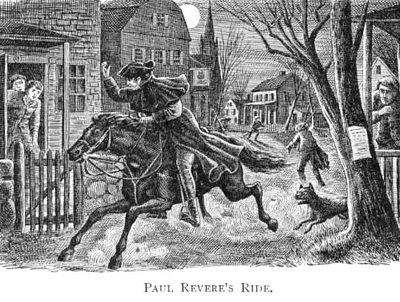
Is the real Christian revolution to be found in the theo-left's dead-end of creeping non-belief, or in new forms of churches? George Barna, one never to be ignored, sees signs of life with new forms that institutional churches have trouble even comprehending. This article should supply us with great fodder for reflection and self-examination for church leaders. It reminds me of the central thesis of Art Jaggard's book, The Future of Religious Organizations: that small, nimble organizations are better equppied to thrive in chaotic times.
Same Faith, No Steeple
By MICHELLE BEARDEN , The Tampa Tribune
Tampa Bay Online
Apr 16, 2006
There's nothing in the Scriptures that says you have to get your spirit filled in a sanctuary.
So on this Easter morning, when crowds pack churches like no other Sunday of the year, the Rev. Roy Hayes will celebrate Christ's resurrection in a living room in Valrico.
"You go where the people are," he says simply. "And they don't always want to be in a traditional church."
Hayes, 57, pastor and founder of the nondenominational Anointed Word Church of Tampa Bay, is catering to a new generation of Christians. They're worshipping, studying and living their faith in home-based groups and workplace ministries, on the Internet, through community outreach programs, 12-step recovery groups and home-schooling networks. Some are members of a congregation. Others reject organized religion because the churches established by their grandparents don't meet their spiritual needs.
Although Hayes plans to lead a traditional Easter church service later this morning, he values the neighborhood Bible studies at the suburban home of his assistant minister, Sherron Small. A handwritten sign propped by the front door welcomes newcomers: "No need to knock. Come on in!"
"The church is ... where the people are gathered," he says. "If you want to go to another level, you have to think at another level. Some folks just want to put on their flip-flops and sit together in a laid-back setting like this. So this is what we give them, so they can know the word of God."
Researcher-author George Barna, who has studied religious trends for 22 years and is a paid consultant to Christian groups across the country, calls this new wave of seekers "the revolutionaries." He says they're the pioneers of what could be our nation's next Great Awakening - a definitive turning point in which Christianity experiences a major revival.
Ignore them, he warns, and the conventional church may not survive.
"This is not a fad," he says in a phone interview from The Barna Group's headquarters in Ventura, Calif. "This movement will reshape the Christian community as we know it today."
Among the findings detailed in his new book "Revolution": By 2025, the local church will lose half of its current "market share" to alternative forms of faith expression and experience. One example is the house-church movement, which claimed less than 1 percent attendance eight years ago. Today, Barna reports, that number has jumped to 11 percent.
Church leaders should rethink the $5 billion in construction planned across the country, he says.
"Most of [those] could end up being the shopping centers of 2025."
God In Everyday Lives
What drives the revolutionaries isn't fancy buildings and programming; it's their passion for God and a dedication to obedience, love and service to get more of God in their everyday lives.
They're people such as Rick Bennett, 37, a Seminole Heights father of two young children. Raised a Southern Baptist, he earned his master's in divinity. After working at a church for five years, he realized he had more questions than answers about his faith.
"The more I sought God in the Bible, the more sure I became of Jesus and less sure of the institutional stuff that gets thrown at us," he says.
Today, he and his wife, Kristi, host a kid-friendly group on Sunday nights called Something Different. Participants have a potluck dinner, do sacred readings and discuss Scripture.
The Bennetts also practice their faith by supporting and contributing to causes they believe reflect Christian values. They are environmentally conscious, support fair trade and nonviolence, and eat locally produced natural foods as often as possible.
Even Rick's career is a calling. In his first nonchurch job since college, he works as senior director of volunteer services at Metropolitan Ministries, an organization that jibes with his views on serving and empowering the economically disadvantaged.
One reason the Bennetts and others like them can pull away from the church is they no longer need it to find fellowship. When Rick Bennett wants to chat with like-minded Christians, he goes to Internet sites such as emergentvillage.com, described by its creators as "a growing generative friendship among missional Christian leaders seeking to love our world in the Spirit of Jesus Christ."
Bennett says he doesn't fit neatly into one category. He shares many of his Baptist friends' conservative values, yet his stands on social justice issues are liberal. He has been called a post-modern, post-congregational Christian. He prefers to be considered a middle-of-the-road moderate who strives to love and accept all people.
"I take my faith extremely seriously," he adds.
He suggests churches with no growth and little life in the congregation, "just close down for a while."
"They can keep the worship services, but shut down everything else and re-evaluate."
Cycle Of Renewal
Dave Travis of Leadership Network, a Dallas firm that consults on church innovation and empowering church leaders, says Barna "threw a curve" to the Christian groups that have hired him and relied on his expertise for years.
"He evolves his business in a new direction every five years or so," Travis says. "This is just part of the cycle."
To get feedback on "Revolution," Leadership Network conducted a survey on its Web site, asking "Have Barna's Revolutionaries Come to Your Town?" It drew about 500 respondents, most of them pastors and ministry leaders.
Only about a fifth of survey respondents observed a growing rejection of worship services, Travis says, but a majority agreed that churches have lost influence. They were split over whether churches will be effective, and on whether people increasingly see church participation as optional.
American Christianity is like everything else, Travis says, in that it has a natural renewal cycle. Effective churches will "constantly reflect on what they do and why they do it," he says, and be open to change.
"Not the message, but the methodology," Travis says. "I can see why a United Methodist bishop might be concerned about the future if a structure is in place that resists new thinking. But a pastor of a large independent church should be far less troubled."
That thinking doesn't reflect the ways society is changing, says Diana Butler Bass, senior research fellow and director of the Project on Congregations of Intentional Practice, a Lilly Endowment-funded study of mainline Protestant vitality.
She says the entire religious community should be on alert.
"There's a shift in Western culture that's turning away from eternal authorities and putting more responsibility on individuals," she says. "The churches with leaders who view this shift as an opportunity and not a threat are the ones that will survive and become stronger."
In her study of 50 mainline congregations, Bass found a hunger for "robust spirituality." But religious institutions tend to be entrenched in bureaucracy, she says. They are the first hurdle people face when they come up with creative ways to exercise their faith.
Offering a healing or meditative service, or dedicating part of the church building as a hospitality center for the temporarily homeless, for example, may be too "out there" for some traditionalists. Those seeking new paths for their spiritual walk will drift away or find a more accommodating environment, Bass says.
Community Mission
Sandy Kezar wasn't about to let them get away.
When she and her husband, Dennis, 59, an Episcopal priest, were based at Christ Church in Bradenton, she noticed that some people would drop off their spouses or children for choir practice or Bible study, then leave.
She proposed killing an hour or two while waiting for family members at church by gathering at a bar for some spirited discussion.
The group grew, its members ranging from secure Christians to atheists. They called themselves The Hedonists and Heretics. During the five years they met, their only rule was no one could say, "You cannot say that."
"Community can mean all kinds of things," says Kezar, 67.
Now she and her husband are at St. Mary's Episcopal Church in Tampa, where some members rotate in small groups for a monthly dinner club. Kezar also teaches an iconography class and Christian yoga, opening the church to people who have no interest in becoming members or attending services.
"The Kezars are willing to meet you where you are, instead of dictating how you should think," says Rex Eaton, 54. He and his wife, Susan, 55, joined the parish in August because they wanted a community-minded church that provided a balance of tradition and innovation.
Eaton is reflective of those Barna revolutionaries who remain committed to their churches but also seek active ways to meet their spiritual needs. He devotes three hours every Thursday volunteering at the Trinity Cafe, a faith-based mission that serves home-cooked meals to the homeless.
"Jesus is very specific in his commission to help the poor," Eaton says. "With the government's role decreasing, the church has to do a better job of instructing people to get out and be more involved, instead of putting all the focus on what goes on inside the building."
Principles Of Faith, Charity
That's the focus of the new Grace Community in Wesley Chapel, led by Jeff Olsen, 29, a University of Florida undergraduate and father of four girls. He supports the notion that the church at large is undergoing a revolution, and must adapt or lose validity.
His church's mission - he calls it the community mission - is to be more externally than internally centered. Sunday's attendance is less important than what members do the rest of the week, Olsen says, whether it's volunteering at school events, coaching a soccer team or leading a neighborhood cleanup.
He's a Lutheran, but labels mean nothing here. Rather, bonds are forged on shared Christian principles.
Olsen moved here from Minnesota last fall after six years in ministry to build a diverse congregation that shared his vision. He knew he didn't want a church that claimed to be "new and different" because it had state-of-the-art technology, edgy music and a contemporary building. This would be a congregation that would be a "blessing to others, 24/7, where we live, learn, work and play."
Grace officially launched this month in a rented facility at the Kids Are Kids Learning Center in the Meadow Pointe subdivision. Attendance is about 100 people, with 30 or so active participants.
"The older generations built the buildings. The boomers set up programs. Now we've got an emerging group, much more interested in relationships and forming communities. Even television reflects that, with reality TV and programs like 'Extreme Makeover,'" he says.
"The revolution isn't coming. It's already here."
Source: http://www.msnbc.msn.com/id/12336386/
Saturday, April 15, 2006
The War on Easter
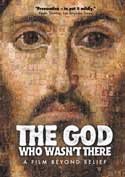
First, this is NOT a parody. Check the website. Second, I am NOT paranoid. Third, I an NOT worried! Fourth, I AM praying for these sad people. He is Risen; He is Risen indeed!
FOR IMMEDIATE RELEASE
CONTACT: Zoe Lee, Beyond Belief Media
(323) 874-1517, publicity@thegodmovie.com
BEYOND BELIEF MEDIA LAUNCHES PREEMPTIVE STRIKE ON EASTER
Copies Of Controversial Documentary Are Hidden In Churches Throughout U.S.
Hollywood
-- April 11, 2006.
Declaring War on Easter, Beyond Belief Media has launched a preemptive attack on the Christian holiday, the company announced today. "Operation Easter Sanity" has already begun.
Using its documentary THE GOD WHO WASN'T THERE as the chief weapon, Beyond Belief Media is covertly planting DVDs of the film in churches throughout the United States. The popular movie, currently ranked #1 on Amazon.com's independent documentaries list, is critical of the irrational beliefs of Christians and asserts that Jesus Christ did not exist.
A total of 666 DVDs will be hidden like "Easter eggs" in sanctuaries, church yards and other holy areas by Beyond Belief Media's national team of volunteers. The DVDs will be slipped into hymnals and other locations where they are likely to be discovered by unsuspecting worshippers.
Some DVDs will be planted by undercover operatives among actual Easter eggs at churches holding egg hunts on Easter Sunday.
"People go to churches to hide from the truth," explained Beyond Belief Media president Brian Flemming, a former Christian fundamentalist. "At no time is this more apparent than Easter, when Christians get together to convince each other that a man died, stayed dead three days, rose from the dead and then flew into the air above the clouds.
"Our nonviolent campaign sends the message that nowhere in the country is safe from the truth. Wherever Christian leaders are indoctrinating children with 2000-year-old fairy tales, the truth may just find its way there.
"Our 'War on Easter' is of course completely without violence of any kind. Christians believe that beating a man to a pulp and nailing him to a cross somehow solves all the world's problems. Beyond Belief Media does not."
More details as well as "battle reports" from field operatives are available at: http://www.waroneaster.org
Source: http://www.thegodmovie.com/press/releases/041106releaseEAST.html
Friday, April 14, 2006
The Long Silence

This classic parable emerged shortly after the Second World War, and its author has never been identified. A good word to hear on Good Friday, 2006.
At the end of time, billions of people were seated on a great plain before God's throne. Most shrank back from the brilliant light before them. But some groups near the front talked heatedly, not cringing with cringing shame—but with belligerence.
"Can God judge us? How can He know about suffering?" snapped a pert young brunette. She ripped open a sleeve to reveal a tattooed number from a Nazi concentration camp. "We endured terror...beatings...torture…death!"
In another group a black man lowered his collar. "What about this?" he demanded, showing an ugly rope burn. "Lynched, for no crime except being black!"
In another crowd there was a pregnant schoolgirl with sad eyes: "Why should I suffer?" she murmured. "It wasn't my fault."
Far out across the plain were hundreds of such groups. Each had a complaint against God for the evil and suffering He had permitted in His world. How lucky God was to live in Heaven, where all was sweetness and light. Where there was no weeping or fear, no hunger or hatred. What did God know of all that man had been forced to endure in this world? For God leads a pretty sheltered life, they said.
So each of these groups sent forth their leader, chosen because he had suffered the most. A Jew, a black man, a person from Hiroshima, a horribly deformed arthritic, a horribly deformed child.
In the center of the vast plain, they consulted with each other. At last they were ready to present their case. It was rather clever.
Before God could be qualified to be their judge, He must endure what they had endured. Their decision was that God should be sentenced to live on earth as a man:
Let him be born a Jew. Let the legitimacy of his birth be doubted. Give him a work so difficult that even his family will think him out of his mind. Let him be betrayed by his closest friends. Let him face false charges, be tried by a prejudiced jury and convicted by a cowardly judge. Let him be tortured.At the last, let him see what it means to be terribly alone. Then let him die so there can be no doubt he died. Let there be a great host of witnesses to verify it.
As each leader announced his portion of the sentence, loud murmurs of approval went up from the throng of people assembled. When the last had finished pronouncing sentence, there was a long silence. No one uttered a word. No one moved. For suddenly, all knew that God had already served His sentence.
Thursday, April 13, 2006
So How Many Pieces of Silver Did That Go For?

From today's New York Times:
April 13, 2006
How the Gospel of Judas Emerged
By BARRY MEIER and JOHN NOBLE WILFORD
When the National Geographic Society announced to great fanfare last week that it had gained access to a 1,700-year-old document known as the Gospel of Judas, it described how a deteriorating manuscript, unearthed in Egypt three decades ago, had made its way through the shady alleys of the antiquities market to a safe-deposit box on Long Island and eventually to a Swiss art dealer who "rescued" it from obscurity.
But there is even more to the story.
The art dealer was detained several years ago in an unrelated Italian antiquities smuggling investigation. And after she failed to profit from the sale of the gospel in the private market, she struck a deal with a foundation run by her lawyer that would let her make about as much as she would have made on that sale, or more.
Later, the National Geographic Society paid the foundation to restore the manuscript and bought the rights to the text and the story about the discovery. As part of her arrangement with the foundation, the dealer, Frieda Tchacos Nussberger, stands to gain $1 million to $2 million from those National Geographic projects, her lawyer said. There may even be more.
Details of how the manuscript was found are clouded. According to National Geographic, it was found by farmers in an Egyptian cave in the 1970's, sold to a dealer and passed through various hands in Europe and the United States. Legal issues in its transit are equally vague.
No one questions the authenticity of the Judas gospel, which depicts Judas Iscariot not as a betrayer of Jesus but as his favored disciple.
But the emerging details are raising concerns among some archaeologists and other scholars at a time of growing scrutiny of the dealers who sell antiquities and of the museums and collectors who buy them. The information also calls into question the completeness of National Geographic's depiction of some individuals like Ms. Tchacos Nussberger and its disclosure of all the financial relationships involved.
Terry Garcia, the vice president for mission programs at National Geographic, which is based in Washington, said that the organization had "heard some rumors" about possible legal problems involving Ms. Tchacos Nussberger but could not confirm them. He also noted that the organization had disclosed its relationship with the foundation, the Maecenas Foundation for Ancient Art.
Mr. Garcia emphasized that he believed that issues like Ms. Tchacos Nussberger's financial relationship with the foundation or questions about other antiquities she sold were not relevant to the story of the Gospel of Judas. He added that National Geographic had taken on the project because it saw an opportunity to help save a unique document.
"It is not every day that you find a lost gospel," Mr. Garcia said.
But scholars who have campaigned against the trade in artifacts of questionable provenance said they were troubled by the whole episode.
"We are dealing with a looted object," said Jane C. Waldbaum, president of the Archaeological Institute of America, a professional society. "The artifact was poorly handled for years because the people holding it were more concerned with making money than protecting it."
For her part, Ms. Tchacos Nussberger rejected any suggestion that she was trying to profit from the Gospel of Judas. She described her run-in with Italian officials as inconsequential.
"I went through hell and back, and I saved something for humanity," Ms. Tchacos Nussberger said in a telephone interview. "I would have given it for nothing to someone who would have saved it."
Last week, National Geographic began a large campaign for the Gospel of Judas, featuring it in two new books, a television documentary, an exhibition and the May issue of National Geographic magazine.
The organization did not buy the document. Instead, it paid $1 million to the Maecenas Foundation, effectively for the manuscript's contents. Part of the revenues generated by the National Geographic projects go to the foundation.
The foundation was set up some years ago by Ms. Tchacos Nussberger's lawyer, Mario Roberty, well before it became involved with the Gospel of Judas. Mr. Roberty is the only official of the foundation, which he said was involved in projects like returning antiquities to their countries of origin. He said that when Ms. Tchacos Nussberger turned over the document to the foundation in 2001, he quickly contacted officials in Egypt and assured them that the manuscript would be returned there. He said the foundation had clear legal title to the document.
In National Geographic's narratives, the manuscript takes a long journey through the antiquities trade. Those stories describe Ms. Tchacos Nussberger efforts to sell the Gospel of Judas privately soon after buying it and her subsequent role in its restoration. She is portrayed as driven by religious conviction to save the document.
"I think I was chosen by Judas to rehabilitate him," Ms. Tchacos Nussberger, 65, is quoted as saying in one of the society's books, "The Lost Gospel," by Herbert Krosney. Mr. Krosney is also an independent television producer who brought the gospel project to National Geographic.
Missing from the book is any mention of an incident in 2001 when Ms. Tchacos Nussberger was detained in Cyprus at the request of Italian officials, who wanted to question her as part of a broader investigation into antiquities that had been illegally taken out of Italy and sold elsewhere. Paolo Ferri, the Rome-based prosecutor in the case, said she was charged with several violations involving antiquities but was given a reduced sentence that was suspended because she had, among other things, previously agreed to return an artifact claimed by Italy.
Both the dealer and her lawyer said the issues involved were far less serious than those described by Mr. Ferri, the prosecutor. They also said that all of Ms. Tchacos Nussberger's dealings in antiquities in Italy and elsewhere had been lawful. Her record will be erased in 2007 if she is not charged by Italian authorities with another antiquities violation.
Ms. Tchacos Nussberger said that she, like other dealers, had run into problems because laws governing the antiquities trade had sharply changed in recent years.
According to National Geographic, she bought the Judas document for about $300,000 in 2000 from another dealer who had placed it in a safe-deposit box in Hicksville, N.Y., on Long Island. She tried to sell it to the Beinecke Rare Book and Manuscript Library at Yale University.
Yale officials have not specified why they did not buy the document. But Robert Babcock, curator of early books at the library, said through a spokeswoman that "there were unresolved questions about the provenance."
Then in 2001, Ms. Tchacos Nussberger sold it to an antiquities dealer in Ohio for $2.5 million, but the deal fell apart when the dealer did not make good on the payments.
Aided by her lawyer, Mr. Roberty, she regained ownership of the document and at his suggestion turned it over to the Maecenas Foundation. Under the deal, she is entitled to receive a sum from revenues generated by the Gospel of Judas essentially equivalent to what she would have received from the Ohio dealer, minus the value of several pages of the manuscript that dealer bought. In addition, she is entitled to get back about $800,000 she lent to the foundation for expenses like legal costs and early restoration efforts, Mr. Roberty said.
Mr. Roberty said the foundation had already started paying money to the dealer, but he declined to say how much she had received to date.
Mr. Garcia, the National Geographic executive, said that a critical aspect of the society's contract with the Maecenas Foundation was the group's pledge to return the document to Egypt. Mr. Krosney, the writer, said he was convinced from his discussions with Ms. Tchacos Nussberger that she had acted out of the best of motives.
He said he had raised with Mr. Roberty the rumors he had heard about Ms. Tchacho Nussberger and Italy, and added that the lawyer was "dismissive"of them. He said he never asked the dealer about it.
Hershel Shanks, editor of the Biblical Archaeology Review, said there was inherent tension between the need to conserve ancient objects and deter trade in looted artifacts.
"If you want to learn from the material, you have got to deal," Mr. Shanks said. "I am in favor of rescuing these unprovenanced things because they have important information to impart."
But other scholars remain disturbed. "The owners are trying to take monetary value out of something they don't really own," said Patty Gerstenblith, a law professor at DePaul University in Chicago who specializes in the antiquities trade. "The people with control over the manuscript don't appear to be the rightful owners."
Elisabetta Povoledo contributed reporting from Rome for this article.
Monday, April 10, 2006
O Where Have All the Flowers Gone?
April 18, 2006
Mainline worries about dearth of young pastors
by John Dart
At the end of April, a new TV ad financed by the Episcopal Church will show 30-something Paige Blair of Maine talking casually about how during tough times, church provides her "some solace and perspectives that help me understand, reconcile and forgive." She doesn't think the church "gets everything right," she goes on to say. "I go because if I didn't, people would ask me why. After all, I am the priest of this parish."
Words on the screen then identify Blair as rector of St. George's Episcopal Church in York Harbor, Maine—a church she's served since 2000. Clergy in other regions will be featured in future versions of the 30-second ad—with the proviso that they are of "Gen-X age," reported Episcopal News Service.
The TV campaign reflects the escalating concern of mainline church leaders that the paucity of pastors under 35 will have a negative effect on attracting and keeping young-adult churchgoers.
A newly released study of clergy ages in the largest mainline denomination, the United Methodist Church, shows a dramatic drop in under-35 ordained pastors in the past 20 years. The number of younger clergy dropped from 15.05 percent of the 1985 total to 4.69 percent in 2005. The actual numbers of younger UMC pastors declined from 3,219 in 1985 to 850 last year, according to a report released March 20 by Lovett H. Weems Jr., director of the Lewis Center for Church Leadership at Methodist-related Wesley Theological Seminary in Washington, D.C."
The project originated from a concern that the age of United Methodist clergy is getting disproportionately older than the population the church seeks to reach," said Weems. Most of the figures came as "estimates from denominational offices or from survey responses" rather than from hard statistics, he said. Yet the current low percentage of under-35 ordained Methodist pastors resembles the estimates that Weems obtained from other mainline churches: American Baptists and Disciples of Christ each at 5.5 percent, the Evangelical Lutheran Church in America at 4.86 percent and the Episcopal Church at 4.1 percent. The Presbyterian Church (U.S.A.) total was higher, at 7.1 percent, but that was a figure from 2002."
With this study the drumbeat of concern is growing louder," commented Ann Svennungsen, president of the Atlanta-based Fund for Theological Education (FTE). "But the key will be whether we hear it and all of the church's institutions hold themselves accountable for inviting qualified, diverse young people into ministry."A much-reported factor in recent decades is the high ratio of new seminarians who are second-career men and women entering the ministry at older ages, thus contributing to the overall graying of pastors. Also, according to the March 17 New York Times, more seminarians today seek a degree not to become pastors but to bring their theological and ethical perspectives into other kinds of work.
The FTE this year announced a $6 million, four-year grant from the Lilly Endowment to encourage congregations to recruit under-35 candidates for the ministry with the aid of grants to offset tuition and living expenses."This work should be one of the church's highest priorities," Svennungsen said. "Leadership matters, for the health of congregations and for the strength of the congregation's mission in the world."
Weems put it similarly: "The issue of enlisting younger quality clergy must be seen side by side with the quality and vitality of the church itself." Citing the analysis by author Gil Rendle in The Multigenerational Congregation, Weems said that church leaders "have to contend with the worldviews of multiple generations together."
Source: http://www.christiancentury.org/article.lasso?id=1979
Egypt Alert! ABC Leadership Continues to Live in a State of De-Nile!
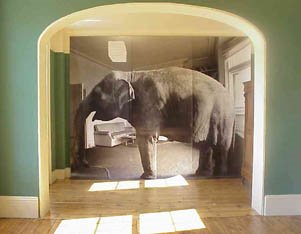
See the elephant? The big one in the living room? Yep, I do. But not these Valley Forge visionaries. Occaisional flashes of realism are bolded. Gimme a break...
From the Worldwide Faith News archives www.wfn.org
ABCUSA: General Executive Council Delves Into Weighty Matters At Meeting
From "Jayne, Andy" <Ajayne@ABC-USA.org>Date Mon, 10 Apr 2006 14:40:19 -0400
VALLEY FORGE, PA (ABNS)-The General Executive Council (GEC) meeting of the American Baptist Churches USA took significant steps in attempting to position the mission and ministry of ABCUSA for the 21st Century. The stage for this meeting, which was held from April 5-8 in King of Prussia, Pennsylvania, was set by the action of the GEC itself at its November 2005 meeting in Green Lake, Wisconsin. The GEC in its gathering acknowledged the brokenness of our relationships and need for healing.
Internationally recognized facilitator, Trish Jones, led the GEC through the process of examining the operational system of ABCUSA. Dr. Jones assisted the group in identifying four critical areas for review: structure, leadership, the representative process and relevance. These four areas represented common ground for the GEC participants.
A scheduled meeting in June will involve a brainstorming session to clarify solutions with a high level of specificity. The outcome will be distributed to a wider ABC audience for input. A September meeting will negotiate possible courses of action. This GEC meeting was imbued with a sense of hope as well as an element of urgency. Participants experienced movement and progress toward concensus, and the day and a half of discussions were held on a positive and high level without conflict or confusion.
Also leading a session of the GEC meeting was well-known consultant, Dr. David Roozen, who placed the weighty issues facing ABCUSA in a wider context. Dr. Roosen pointed out that mainline or oldline denominations as well as other denominations in the United States are all facing difficult issues regarding downsizing, diminishing financial resources, and other troubling matters between leadership and congregational life.
For the GEC, however, their meeting was touched with a God-moment as new light began to emerge from the distant horizon. [Oh, be still my heart! What light from yonder horizon breaks!] A new day seems to be dawning as a new vision is birthing around the Focus Statement: American Baptist Churches are Healthy Missional Churches that Nurture Devoted Disciples of Jesus Christ who Live Their Lives in Mission and Ministry for the Healing of the World through the Love of Christ. This Statement grew out of Seek It! and the Seven Key Ministry Areas of Radical Discipleship, Healthy Missional Churches, Leadership, Church Planting, Youth, Stewardship and Mutual Faithfulness.
Andrew C. Jayne American Baptist Churches, USA Mission Resource Development http://www.abc-usa.org/
Source: http://www.wfn.org/2006/04/msg00096.html
A Gnewer Gnosis?

One of my church members alerted me to this AMAZING DISCOVERY! You can read all about it at http://theconstructivecurmudgeon.blogspot.com/2006/04/gospel-of-brutus-revolutionary.html. He even gave me the clever title! Thanks, JE!
The Gospel of Brutus: A Revolutionary Revelation About the Real Jesus
The National Oceanic Society has recently released a long-lost and world-changing document, The Gospel of Brutus, which was found in a water-tight piece of pottery off the Greek coast. The Gospel, written by an unknown follower of Jesus named Brutus, reveals the inner teachings of Jesus that were long suppressed by the orthodox, power-mongering, and generally narrow-mined and anal-retentive clerics throughout history.
The document claims that Brutus was a secret Greek follower of Jesus, to whom Jesus disclosed the true, secret, inner, esoteric, and self-empowering teachings that he never revealed to his other disciples. In fact, what he told Brutus completely contradicts most everything in the four canonical gospels. The document, dated by scholars to have been written in about 300 CE, but composed about a century earlier, shows that Jesus was not Jewish in this worldview or sensibilities at all. For example:
"To you, Brutus, I reveal the mysteries, secrets, and inner realities of the Kingdom of Spirit—truths not known to those enslaved by the earth and its supposed Creator, Yahweh.” Hence, the idea that Jesus was a Jewish Rabbi who frequently quoted the Hebrew Scriptures is just a bald-faced lie. That is merely what the orthodox power-players want you to believe.
Jesus further says: "O Brutus, it is the Greeks, not the Jews, who truly understand the ways of the inner kingdom. The body is a mistake, a trash heep. I have no body, but only the ignorant cling to it, as they cling to all errors, not knowing the fullness of the utterly unknowable, but desirable, Being of Being of Being."
The newly discovered Gospel, of which there are no known copies elsewhere, also gives a remarkable prophecy:
"Far later, O Brutus, my beloved, when the True Unknowable Being will be revealed to beings, after the Time of Darkness, a scholar of the Light, of Truth, of true Prophet and Profit, will make the message known. Her name is Sage Maureen Bagels. She will be the shepherd of this Treasure, and nothing of the refuse of earth will hinder her overcoming. Follow her star and it will become your living fire."
Quite predictably, orthodox scholars have questioned the Gospel of Brutus on the ridiculous grounds that its author is unknown; it must have been written long after the canonical gospels; that its portrayal of Jesus as more Greek than Jewish flies in the face of history (both biblical and extra-biblical); and that an esoteric document of dubious pedigree hardly overturns two thousand years of Christian tradition that begins in the middle of the First Century.
Sage Bagels has already defended the credibility of The Gospel of Brutus in "The Old World Times" and is preparing a learned treatise on the subject. “The people who revered The Gospel of Brutus did not think they were heretics,” she wisely intoned. “Give esotericism a chance,” she also sagaciously pleaded.
Posted by Douglas Groothuis at 12:50 PM Saturday, April 8, 2006.
By the way, Doug Groothuis is a GREAT writer on alternative religions, the New Age Movement, and other challenges to the gospel. Google him and you'll get lots of great materials.
Sunday, April 09, 2006
They Have No Clue

This article shows that the theo-left, as ususal, is clueless. Clueless distortions of what conservative evangelicals believe are bolded.
Posted on Sat, Apr. 08, 2006
What's wrong - and right - with liberal Protestantism?
No one disagrees that the heyday of influence and burgeoning membership rolls is past for most mainline Protestant churches. That's a statistical given. But too often these churches are written off as flickering embers that once were blazing fires. It's a harsh judgment that misses a bigger issue.
In case you're not sure which churches comprise mainline Protestantism, the lineup generally includes the United Methodist Church, the Presbyterian Church (USA), the Episcopal Church, the Evangelical Lutheran Church in America, the Christian Church (Disciples of Christ), the American Baptist Church and the United Church of Christ.
Some religious observers refer to them as old-line or sideline Protestant churches. The inference is that they're, at best, one step away from some ecclesiastical nursing home or, at worst, on life-support with no more than a few years or decades before they flatline.
Recently, two people spoke out in defense of this liberal brand of Christianity.
One is Marilynne Robinson, an award-winning novelist and essayist, who won the Pulitzer Prize for fiction last year for her novel "Gilead."
In the spring issue of the American Scholar magazine, Robinson criticizes those who promote a narrow view of personal piety and presses instead for a broader -- and more biblically based--definition:
"What has personal holiness to do with politics and economics? Everything, from the liberal Protestant point of view," she writes.
[Here we go again: Marxist reductionism of all of life to economics. Where's Bill Herzog? Calling Dr. Herzog!]
She reminds religious liberals, among whom she counts herself, and other Christians that when Protestant reformer John Calvin said all people should be loved, he set no limits.
[And now, the implication is unless you are from the theo-left, you're a loveless Pharisee. How subtle...]
"There is no doctrine here, no setting of conditions, no drawing of lines," Robinson says. "On the contrary, what he describes is a posture of grace, generosity, liberality."
[Has anyone here actually READ Calvin's Institute's? I have. There are plenty of "lines" in there. What we have here is "center without borders" ala Roy Medley.]
When Robinson talks about personal piety, she always links it to helping those in need. In other words, faith without deeds is dead.
[There's an argument here? No one informed me!]
Then there's Gary Cox, pastor of University Congregational Church in Wichita. He recently published a series of sermons titled "Think Again: A Response to Fundamentalism's Claim on Christianity" ($17.95, University Congregational Press).
In his book of sermons, Cox examines several traditional Christian beliefs -- biblical inerrancy, virgin birth of Jesus, physical resurrection of Jesus, Second Coming, among others -- and contends that there's room for different interpretations about each.
[On the resurrection? The virgin birth? Take a detour here, and it isn't Christianity anyone. No matter what Cox or John Shelby Spong says.]
He rejects the "pat answers" of fundamentalists and the belief that "another person is lost forever beyond the grace of God because of the way that person practices religion."
Instead, he believes liberal Christianity offers another entry to faith, "open-minded and radically inclusive," that is separate from fundamentalism:
"I discovered that Anglican theologian W.H. Vanstone was correct when he claimed the church is like a swimming pool, with all the noise coming from the shallow end. I launched out into the deep end of the pool and have found comfort and nurture there ever since."
[Cute analogy, but insipid.]
Two liberal Christians who should make all of us think about faith beyond our comfort zone.
For Marilynne Robinson, faith is not only a personal experience, but also an outward-directed responsibility that compels believers to take action.
For Gary Cox, faith is about not only endorsing traditional teachings, but also encouraging fresh thinking of what they mean.
The two should give us pause to consider, whether we're liberal or conservative or somewhere in between:
Am I faithful to the message I'm entrusted with, or is faith a frill that decorates but has little purpose?
Does faith make a difference in how I interact with others -- from those closest to me to strangers in the street -- or is it a private experience with little public significance?
Do I try to understand the other person's faith -- even if I profoundly disagree with it -- or am I so consumed by the rightness of mine that pride and arrogance control my behavior?
In the end, we can write off part of the family of faith with whom we disagree, or we can listen with respect.
The fact is, whether we take our seat in a mainline, fundamentalist or evangelical church, each of us must finally decide how we'll relate to those who claim the same name as ours: Christian.
Reach Tom Schaefer at 268-6586 or by e-mail at tschaefer@wichitaeagle.com
Source: http://www.kansas.com/mld/eagle/living/religion/14291596.htm
Friday, April 07, 2006
Snake Oil in Time for Easter: The "Gospel of Judas"
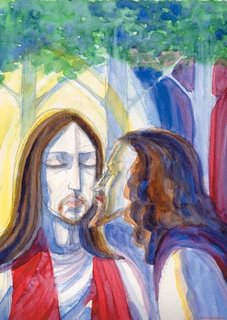
Well, I was out of town for a few days, and didn't even get near a computor. Good to see that Dennis over at His Barking Dog is keeping on top of ABC info.
In the swamp fever da Vinci Code brain bending conspriacy theory world, it's good to see that National Geographic is not to be outdown by Dan Brown and the National Enquirer, nosirreebob! Now, just in time for Easter egg coloring and cross and empty tomb celebrating, we're feted on the non-news of the "discovery" of the so-called Gospel of Judas.
These frauds are EASY to stop and dismiss because of some basic common sense rules.
1. Is the document consistent with the theological testimony of NT Scripture?
2. Is it founded in the same historical world as the NT?
3. Can it be dated in the same time period as the NT? (Which I personally would date between 40 and 95 AD, though there is some wiggle room here)?
If the answer to all three is NO, you have interesting snake oil on your hands, not a gospel. The so-called Gospel of Judas is oily snake oil.
For its origins, see http://en.wikipedia.org/wiki/Gospel_of_Judas.
For the text itself, see http://www9.nationalgeographic.com/lostgospel/_pdf/GospelofJudas.pdf. Any one with a basic acquaintence with Gnosticism can smell this chunk of Limburger a mile off.
Me, I'll happily, with intellect intact, stick with Matthew, Mark, Luke and John.
Monday, April 03, 2006
Colgate Rochester to Share Space with Physical Therapy Students (No, This is Not an April Fool's Posting)
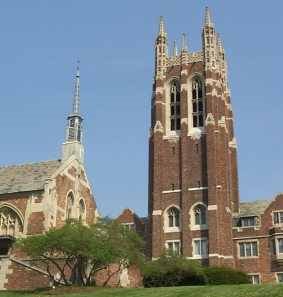
Earlier this year, we reported on the "down-sizing" of Central Seminary. Looks like it's not the only ABC related seminary on the ropes. From upstate NY, we read...
Divinity school gets tenant
Ithaca College's physical therapy center is leaving UR
Matthew DanemanStaff writer
(April 3, 2006) — For nearly 80 years, the divinity school on a South Goodman Street hilltop
has housed students seeking answers to the unanswerable. Now it will house numerous physical therapy students, as well.
The Ithaca College School of Health Sciences and Human Performance Rochester Center, its seven full-time faculty members and roughly 100 students will relocate to Colgate Rochester Crozer Divinity School this summer.
The Ithaca College center has been housed in a University of Rochester facility on East River Road since the early 1990s.But when UR indicated it needed the space, it referred the Ithaca center to Colgate, said Steve Siconolfi, dean of the Ithaca school.
The new tenants come as Colgate has struggled financially in recent years, deciding in 2004 to move most of its 300,000-volume library to UR as a cost-saving effort.
The agreement with Ithaca — a 10-year lease with two options to renew for another 10 years each — "fulfills part of our strategic plan to be better stewards of the property we have and recognize some income from the unutilized portions of our campus," said Colgate President Eugene C. Bay.
Renovations are under way to accommodate the Ithaca center, Bay said. It will occupy 16,000 square feet at Colgate and share another 10,000 with the divinity school. The renovations will create some laboratory space, as well as put in the wiring and technology needed for some instruction, Siconolfi said.
While a divinity school might not seem a likely home for physical therapists, occupational therapists and health educators, "we think this program has a lot of compatibility with the values of the divinity school, and we're anticipating there will be collaborative efforts academically with that program," Bay said.
[I'd say! Based on the theological pedigree of Colgate Rochester, they'll all be dealing with lame ideas!]
Added Siconolfi, "We've discussed what are some things we can work together on. I see that as a definite move in the future."
Bay said Colgate is not pursuing any new space-sharing arrangements with other organizations, although it is in negotiations with the American Baptist Historical Society regarding a new lease for the American Baptist-Samuel Colgate Historical Library, the world's largest repository of Baptist-related research materials.
Source: http://www.democratandchronicle.com/apps/pbcs.dll/article?AID=/20060403/NEWS01/604030319/1002/NEWS
